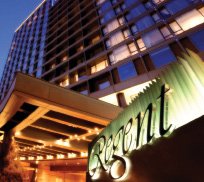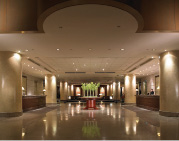- Home
- Media Kit
- Current Issue
- Past Issues
- Ad Specs-Submission
- Ad Print Settings
- Reprints (PDF)
- Photo Specifications (PDF)
- Contact Us

![]()
ONLINE

The Return of Regent
Editors’ Note
Steven Pan is also President and Chief Executive Officer of Pacific Resources Group. Pan joined Formosa International Hotels Group in 1991 and became President in 1992. In 2000, he assumed his current post with the company. Pan founded Pacific Resources Group in San Francisco in 1994 and the group has completed many landmark transactions in San Francisco, Tokyo, and Hong Kong. The group is still active in California and Asia. Pan began his career as an associate with First Boston after earning an M.B.A. from Columbia Business School in 1988. In 1986, he received his B.A. in economics from the University of California, Berkeley.
Company Brief
Regent was founded in the ’70s and became the first truly Asian-based global hospitality group. The founding team was the first to introduce the five-fixture bathroom and the villa resort concept. In the ’80s and ’90s, Regent properties were among some of the world’s most acclaimed hotels, such as the Regent Hong Kong and Regent Beverly Wilshire. The brand was later sold to Four Seasons and then Carlson. Regent looks to return to gateway cities in Regent history such as New York, London, and Shanghai in addition to pipeline projects in Abu Dhabi, Bangkok, Doha, Kuala Lumpur, Phuket, and Puerto Rico, among others. The existing Regents are located in Beijing, Berlin, Bordeaux, Taipei, Turks & Caicos, Singapore, and Zagreb.
Regent Hotels & Resorts (www.regenthotels.com) was acquired by the Formosa International Hotels Corporation (www.grandformosa.com.tw; FIHC), which has become the largest and most profitable hotel company listed on the Taiwan Stock Exchange, with market capitalization in excess of $1 billion and debt free. FIHC owns its flagship Grand Formosa Regent Taipei, which has consistently been one of the most profitable Regent Hotels in the world. FIHC operates lifestyle hotel brand SILKS and multiple restaurant brands throughout the greater China region.
What made you feel the acquisition of Regent Hotels & Resorts was the right opportunity for FIHC and what is your vision for the brand?
As a Regent owner, we have a great interest in the direction and success of the brand, so we felt this was a great opportunity to ensure a positive future for the Regent brand. Additionally, as an internationally recognized luxury hotel brand, this was the perfect opportunity for FIHC to expand into the international luxury market.
Regent was once the world’s most admired hospitality brand, created by visionaries and setting the benchmarks for the industry. We see Regent returning to that position of preeminence as a true leader in the luxury hospitality industry.

Regent Beijing Exterior
Worldwide, we hope to open 30 to 40 hotels that are all bespoke but share in common a commitment to innovation, as well as elegant but simple luxury. The hotels will generally be small with an average of 200 rooms, and they will follow a mixed-use lifestyle model that combines hotel, residential, retail, and wellness components in order to maximize owners’ short- and long-term returns.
You have talked about restoring the brand to its former glory linked to the original Regent DNA. What do you mean by this and how do you define the “Regent DNA”?
The Regent brand in its heyday was the industry innovator and that spirit is what we intend to bring back to differentiate the brand from our competitors.
Our new team consists of the same arrangement as the founding team with American Robert Burns as Honorary Chair, myself, and our European President Ralf Ohletz. Together, as the second generation of Regent, our pure Regent DNA is all about innovation and thinking about the guest experience to raise industry standards.
At the foundation of every Regent hotel are the 3B’s: bed, bath, and breakfast, and Regent once again steps up to blaze new trails with a 4th B: bespoke. Moving forward in the hotel industry, Regent takes a bespoke approach where each hotel is a one-of-a-kind property that promises a unique guest experience.
Where do you envision growth opportunities for the Regent brand and how much will you focus on Asia in the brand’s expansion?
Regent is a global hotel management company and, as such, our geographical focus is evenly distributed in Asia, the Americas, and EMEA. We plan to return to the primary cities where Regent used to be. In Hong Kong, Los Angeles, New York City, and London, we intend to invest in and develop mixed-use hotel properties.
The Regent brand has its roots in Asia and its ownership has now returned to Asia. This, plus the tremendous economic growth taking place in Asia, means that we foresee significant growth potential for the brand in this region. We certainly plan to open Regent properties in the major primary cities of Asia. Our first priority will be Hong Kong, home of the iconic Regent Hong Kong, which was the flagship for the brand in its golden years.

Regent Taipei Lobby
What are your plans for the Regent brand in China?
Being a greater China-based company, we have an advantage in the Chinese market with a more in-depth knowledge of Chinese culture and mentality that will allow us to efficiently allocate our resources. We are establishing a Chinese headquarters in the capital city of Beijing with a dedicated China sales office. Because of the tremendous economic growth in China, we plan to aggressively grow in other primary cities throughout China. We also see opportunities to pioneer whole new resort destinations, especially in China. It will be a perfect showcase for bespoke Regent properties in mixed-use development.
What are your plans for introducing new properties in other parts of the world, including North America and the Middle East?
In terms of North America, the financial crisis has created acquisition opportunities in former Regent cities such as New York City and Los Angeles, which we plan to capitalize on by deploying partners’ capital.
The Middle East is also full of development opportunities. We currently have pipelines in Doha and Abu Dhabi.
There are many executives in the company who have worked with you for many years. How would they define your management style?
I put a significant amount of trust and confidence in my team, so I give a great deal of creative freedom to each member in order to foster talent and demonstrate ability. As an industry leader, it is all about nurturing members and encouraging them to take the initiative. Mistakes are made along the way, but this is part of the growth and development process. The biggest mistake would be passivity and not taking that initial step, though it may be wrong. Innovators and leaders are successful by taking that leap and thinking outside of the box, while pushing the boundaries to set higher industry standards. And I encourage my team to do just that.•